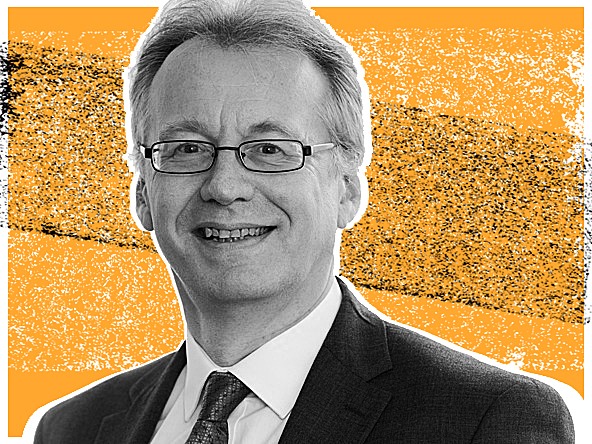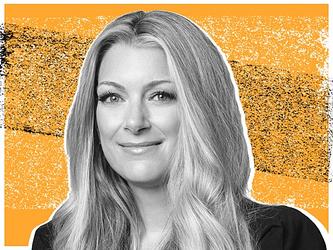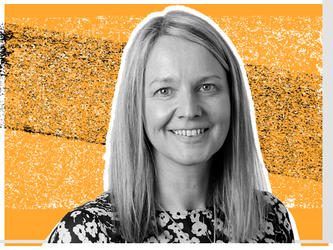How I work: Guy Goodwin, chief executive, NatCen

Katie McQuater (KM): What does an average day look like for you?
Guy Goodwin (GG): Since the end of the pandemic, I am hybrid working, so the average day will depend on whether I’m trekking up to London or down here on the south coast. I was in London the past two days, so that involves a very early start and a reasonably late getting home time. When I went to NatCen at first, I shared a flat in London during the week, but I let the flat go during the pandemic so now I’m doing a commute and it works OK if it’s two or three days a week. If it gets to four days, you start getting tired. At the moment, it’s working OK.
I get up to London and start work by 9 o’clock, and I will typically get back somewhere between 7 and 8pm.
KM: Do you find the commute a useful use of your time?
GG: As CEO, at the moment I’m doing about 70% strategic stuff and 30% reactive, so I think that’s right for NatCen, because we are looking to diversify out and do very exciting things with the organisation. I see that they are paying me to do a lot of that thinking and strategic side, so the train journey isn’t an issue for me because you can do a lot of thinking.
KM: What’s your biggest priority at the moment, what’s keeping you busiest?
GG: We know we’re entering a recession, there are risks to every organisation as we go through that. Research commissioning may drop, it may get tougher and more competitive for less and less work. We know government departments are going to be squeezed on budgets, we’re seeing that already, so there’s something about making sure we’re winning enough work and being quite innovative in doing that. At the same time, there’s also a piece around just being able to do our operational side, our data side, our production side more efficiently and smarter. I think with the move towards more mixed mode multi-mode data collection in particular, it is important that we are smart in the way we do things.
KM: Do you find that the type of work you focus on is different at home compared with the office?
GG: It’s largely the same but you make some adjustments. Even before the pandemic, I typically looked to work at home as much as I could on a Friday, because if you have one day at home you can sweep through all the stuff you’ve got to read, the writing you’ve got to do and that’s easier done at home, if you plan it right, rather than in the office where people can distract you. Having two or three days at home with the hybrid working, you adjust accordingly – so you stack your meetings to a degree.
I don’t think I’m more efficient on hybrid working but I don’t think I’m particularly less so. The issue down here on the south coast, unlike in London, where you don’t really talk to your neighbours, is that the postman or woman or window cleaner comes round and wants a natter, so you have to be a little bit careful!
KM: Is there anything that particularly helps you to focus while working from home?
GG: The honest answer is that I am completely driven so I don’t need any encouragement around focus. You know, I’m doing what I enjoy, I like the work I’m doing so you don’t need encouragement to focus on that.
KM: Do you find you’ve got the balance right between between work and life?
GG: You go through the cycles in life, don’t you? When you’re young, just out of university, you’re not in a partnership yet, you haven’t got a mortgage or kids, you have time and working late is not necessarily an issue.
I got married and had my daughter, Julia, and then in my early 30s my dad became very ill and after four or five years of illness, he died. I then became next of kin to my granddad, who lived until he was 97 and in the last few years of his life was passed around hospitals and not especially well. I sort of became a sandwich carer, I think they would call it nowadays.
When my dad was ill, I was working at the time in private office and I really focused on not falling into the trap of work becoming your life. It sounds bizarre, but I wrote down a list of things that matter to me. Effectively they fall into four categories – relationships, health, leisure and work, of which work is the least important to me. I decided at the time that I was not going to fall into the trap of being knackered and working all hours, so I don’t work weekends unless it’s exceptional and I won’t work late. I decided to go into work early so I could see my daughter at 5pm or 5.30pm.
Even now, at 57, I still have my little list. I don’t look at it as often as I used to, but I do look at it every year. On it are things like relationships – with my partner Debbie, my daughter and the rest of my family – and I mark it out of 10. Systematically, I revisit it and have a little look: how’s my health, am I doing the walking I want to be doing, am I feeling fit? I love travelling, I am a curious person, I like the sea, the theatre and reading, going to Gosport Football Club, even though no-one would necessarily really enjoy that! I look at whether I am enjoying those things, because those are the important things in life – you never get to the end of life and say: ‘I wish I’d worked more’. I think I’d be very sad if I did – it’s not the highest priority in my life, so I still look at that little list occasionally and make sure I’m OK.
I think it’s also about not taking yourself too seriously. You see the awful mess politicians get into – power can corrupt, can’t it? And you do have a lot of power as CEO. So, you want to stay level-headed – it’s fair, not just for you and your family, but also your employees and everyone you work with. You’ve got to be at a sensible level and have good self-awareness. I have no ambition to be Donald Trump!
KM: It’s almost like a performance review of your life. Is that something you look at in the new year?
GG: It’s normally around Christmas when I have a bit more time. I think it’s important because as a CEO, people around you sacrifice things, so its important you keep perspective and you see how those around you are feeling.
At Christmas, I went to Australia for the first time to see my daughter who is backpacking– we spent new year there together and Debbie and I saw all the tourist sights. I would hate to get to the end of life and wish I’d done some of that. You should keep perspective – and you don’t know when your health might deteriorate as you get older.
KM: How do you motivate others in the organisation to have good boundaries between work and life?
GG: With my immediate team, I chat through what their aspirations are and really reinforce that whether they’re moving house, got new relationships or whatever it is, that those are important. If you’ve got an ill family member or whatever it is, there are times in your work life where you just need to down tools – or if you’re unwell, don’t keep going. I think it’s important to encourage that.
You can also be a role model. It’s relatively rare that I will stay beyond 6 o’clock in the office. I do get in early, I’m an early starter and I think that was the right move because earlier in my career it enabled me to have quite a lot of time in the evening with my daughter. So, if you have additional work, try to get in early and not later.
I remember once having a boss who didn’t understand that. I remember one occasion when the HMCI – Chris Woodhead at that time – wanted a late meeting to discuss something urgent and I apologised to my boss and said that I needed to pick up my daughter, and she asked me to arrange something else, but my wife wasn’t around. I remember going in to Chris Woodhead and saying ‘I’ve got to go and pick my daughter up in 15 minutes. Do you mind awfully if I get my item done quickly upfront?’ He said ‘yes of course, head off and get your daughter.’ I remember my boss looking absolutely horrified!
That was a while ago – it’s more normalised now. But you do have to be quite firm and it can be quite tiring, especially when you get home and your child has their toys lined up and wants to play. That is a tiring period and you really have to keep strict control of your hours at work.
KM: Should people just speak up if they need to leave early?
GG: Of course they should. Increasingly they are and I think that’s a good thing. You have to just recognise there are different life cycles and not be too hard on yourself.
KM: Are there any tips and tricks you’ve learned over the years that you can share with our readers on how you get everything done?
GG: When you get to my level, money is not what you’re short of, it’s time. You really have to manage your time well. I went on a time management course when I was in my 20s and it was an eye opener. You can reduce your time as a leader by delegating more, by getting more staff, by having more reasonable balance, you can do it simply by little tricks like not looking at your calendar or emails every five minutes, by being quite disciplined about how you manage your time. I think the secret is to think that time is the resource, and you want as much as it for all the things you want to do in life as possible.
You’ll be amazed how much time we all waste in a day. Even now, as an experienced leader, I waste time – I’m tempted to look at those emails or to do things in a non-logical way. You have to be quite disciplined about how you do things. And do things well, always – because if you don’t do things well first time, you end up spending far more time on them.
One of the things about being a relatively shy person, is that you will do things like write emails, whereas experience tells you to just pick up the phone – and then you’re saving yourself writing an email for 20 minutes when you’ve just had a two-minute conversation. The amount of time people are on emails and social media etc when they don’t need to is very high.
KM: What motivates you professionally?
GG: What motivates me is a sense of self-satisfaction that I’m doing a really good job at the organisation I’m working for, so I need to feel that I’m achieving something. I like the idea that I’m giving back to the organisation or my line managers over the years the investment they’ve made in my training.
I believe I’m a good leader and a lot of people have put a lot of investment in me to make me that – it’s not that I’m a genius or something, it’s investment in me over many, many decades, so I’m very grateful for that. So now I feel I want to give back some of that experience, knowledge and training.
But I’m also still a really driven person who fears failure, if I’m being honest. If I’m being brutally honest, I come from a relatively poor family. My granddad was a docker and my sister and I spent a lot of the time in quite a poor background while my dad was earning his money. That drives you to an extent – you realise how privileged and lucky you are now, so it’s always at the back of your mind that you don’t want to go back or to fail – you really want to make sure you are still at the top of your game.
KM: I like your point about giving back what others have handed down.
GG: At the beginning of the pandemic, in March 2020, all fieldwork was suspended. At that point, NatCen was facing a huge monthly loss and all of its interviewers wouldn’t have had work so they would have left and found other jobs. Experience and training told me that at that time, when everyone was panicking and emails were flying around, just to sit down, and think this through. While doing the cooking in the evening, I thought to myself, where is the risk? The big risk is that the pandemic goes on for ages, we don’t have any face-to-face interviewing, the field force does a runner, we’re loss-making and we start to get into financial difficulties.
So, you need face-to-face interviewing, and where is that going to be at this time? It’s going to be with ONS, going round collecting the swabs, to inform how many people have got the virus. So, I got in behind the ONS in terms of the Covid infection study, that led to the contract NatCen got and the interviewers collecting swabs which meant there was no financial pressure during the pandemic.
You could say ‘Guy, you’re a genius, that was a personal intervention that brought in the money during the pandemic’, but I’m not a genius – it’s just training. Just stop – don’t look at all your hundreds of emails coming in, just stop and follow the risk. All that training on risk management and mitigation is built in to your thinking. Training and investment made me do the right thing at the right time as a leader. It’s a nice thing to do, but it’s not genius. It was just a systematic assessment of the risk, which is what I had been taught to do.
We’ve had a pandemic and now a recession and you’re seeing research firms closing up, it’s like a perfect storm. In a perfect storm, it’s not unusual for everything to hit you at the same time, and then everyone wants a meeting with you, everyone is sending emails. If you’re not careful, you become 90% reactive and 10% strategic. At those times, you have got to have the common sense and ability to close your computer screen, sit down and do what you’re paid to do, which is to think through things.
KM: Any last thoughts?
GG: I’ll share one little anecdote. In training programmes, there’s a lovely exercise they do – they give you a topic which they know you’re passionate about and can get quite cross about. So, they give you this topic of Jacob Rees-Mogg wants to do this, or whatever, and you go off on one. Then they chuck you in a room and tell you to think about the most precious thing in your life for a minute – so, my daughter. Think about that, and then you come out and go through the topic again. When you come out, you look at it through completely different eyes, and you don’t rant. It’s a little trick – if you’re ever under pressure, just go into a room for a minute, think about something you love and then come out and the perspective is very different – you’re much more likely to compromise, come up with solutions and see a way through things.
This interview has been lightly edited for clarity.

We hope you enjoyed this article.
Research Live is published by MRS.
The Market Research Society (MRS) exists to promote and protect the research sector, showcasing how research delivers impact for businesses and government.
Members of MRS enjoy many benefits including tailoured policy guidance, discounts on training and conferences, and access to member-only content.
For example, there's an archive of winning case studies from over a decade of MRS Awards.
Find out more about the benefits of joining MRS here.














0 Comments